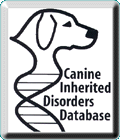
Hypoadrenocorticism (Addison's disease)
Hypoadrenocorticism (Addison's disease) is a rare but serious disorder of the endocrine system caused by the gradual destruction of the cortex of the adrenal gland, most commonly by the body's immune system . (Cancer, hemorrhage, or certain drugs can also cause adrenocortical destruction.) The result is a decrease in production of glucocorticoids and mineralocorticoids - adrenal hormones that are necessary for a wide range of body functions. Deficient production of these hormones produces a diverse array of clinical signs, many of them vague.
The condition is more common in young female dogs and in the breeds listed below.
unknown.
Mineralocorticoids and glucocorticoids normally produced by the adrenal gland are instrumental in regulating many body functions. A deficiency of these hormones therefore causes a variety of clinical signs. The most common problems noticed by owners include depression, weakness, loss of appetite, shaking or shivering, vomiting, diarrhea, and increased thirst and urination. Your dog may experience any or all of these and with varying degrees of severity.
When these vague signs go unnoticed or undiagnosed, dogs with hypoadrenocorticism may become seriously ill very quickly, developing acute adrenocortical insufficiency (Addisonian crisis). This is a life-threatening medical emergency requiring immediate treatment to correct the dehydration and electrolyte imbalances present.
Because of the variety of clinical signs, hypoadrenocorticism is often difficult to diagnose. Commonly dogs with this condition will have a history of vague illnesses associated with periods of stress, that responded to non-specific treatment and supportive care such as cage rest, or giving intravenous fluids to treat dehydration.
Ultimately diagnosis is made based on the combination of clinical signs, suggestive results of routine blood tests, and the results of a specific test for this disorder.
Dogs with hypoadrenocorticism are treated with lifelong mineralocorticoid supplements, often with glucocorticoids as well. Your veterinarian will measure your dog's electrolyte levels regularly until the appropriate dose is found, and then sporadically after that. Hypoadrenocorticism can usually be well-controlled in this way although you should be alert to signs of relapse or illness in your dog, particularly during periods of stress (such as surgery or trauma).
Dogs in collapse with acute adrenocortical insufficiency must be treated immediately with intravenous glucocorticoids and large volumes of intravenous fluids to correct dehydration and electrolyte imbalances. Your veterinarian may start giving your dog oral mineralocorticoids at this time, or wait until your dog is stable.
For the veterinarian: Most electrolyte imbalances are corrected by rapid fluid and glucocorticoid administration. Severe metabolic acidosis, hypoglycemia and hyperkalemia causing cardiac conduction abnormalities may require additional therapy, and should be treated as necessary if not responding.
CLINICAL PATHOLOGY: typically see hyponatremia, hyperkalemia, and hypochloremia. Dogs often have a normochromic, normocytic, nonregenerative anemia (possibly masked by dehydration), and prerenal azotemia. Dogs in hypoadrenal crisis typically have a Na/K ratio of less than 20, and often show hypercalcemia and mild to moderate acidosis.
Diagnosis is by measurement of cortisol pre- and post-ACTH (ACTH stimulation test).
ELECTROCARDIOGRAM: Changes typically reported with hyperkalemia (eg. small or absent P waves) correlate poorly with serum potassium levels in dogs with hypoadrenocorticism.
Although little is known about the inheritance of this disorder, it is prudent to avoid breeding affected animals or their close relatives.
FOR MORE INFORMATION ABOUT THIS DISORDER, PLEASE SEE YOUR VETERINARIAN.
Kintzer, PP and Peterson, ME. 1995. Hypoadrenocorticism in dogs. In JD Bonagura and R Kirk (eds) Kirk's Current Veterinary Therapy XII Small Animal Practice. p 425-429. WB Saunders Co. , Toronto.
- (Disorder) related terms:
- Disorder Type:

